
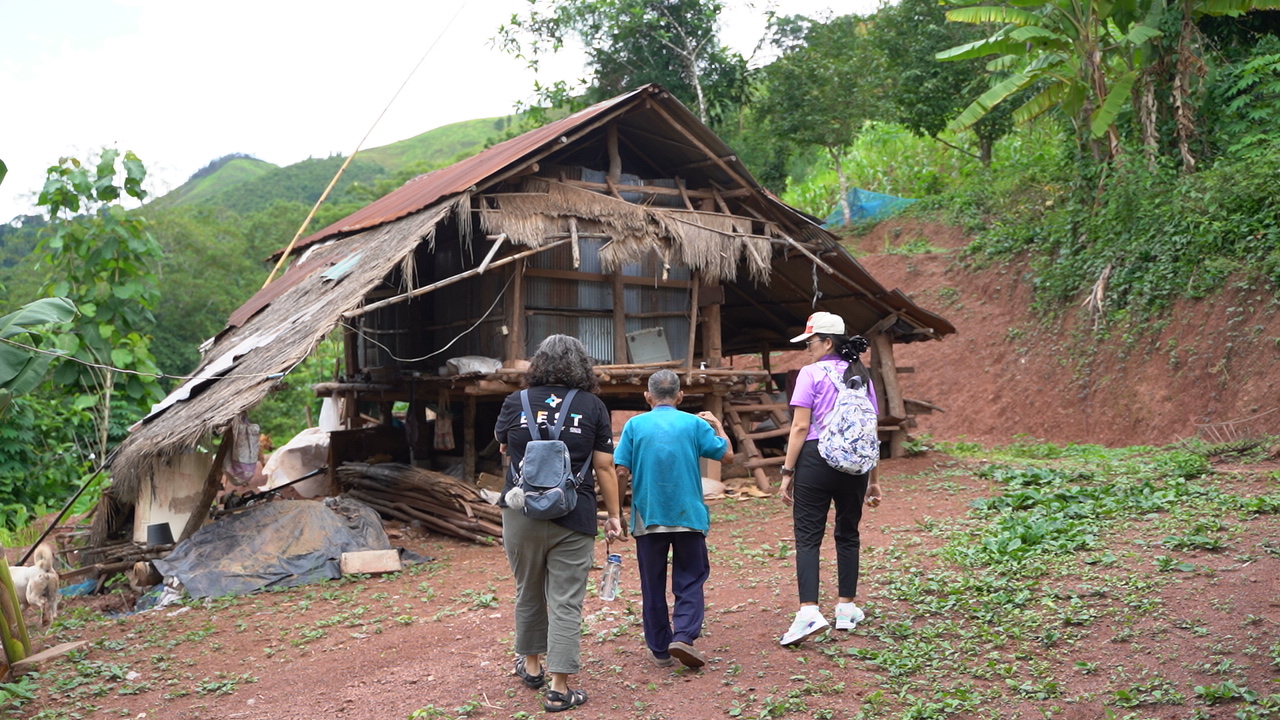
Background
To disseminate the knowledge received from the research project name “Research project to develop knowledge construction system in conducting research on vulnerable populations, for research capacity building and empowering research to improve the quality of life of vulnerable populations”
This research project was performed by the ThaiHealth Academy or THA (a specialized unit of the Thai Health Promotion Foundation or ThaiHealth) which receives fund support from the Health Systems Research Institute (HSRI) and Health Promotion for Vulnerable Populations Section (Section 9), ThaiHealth. This research has the purpose to disseminate of research findings and knowledge to researchers, practitioners, and other groups that working with or conducting research with vulnerable populations or groups.
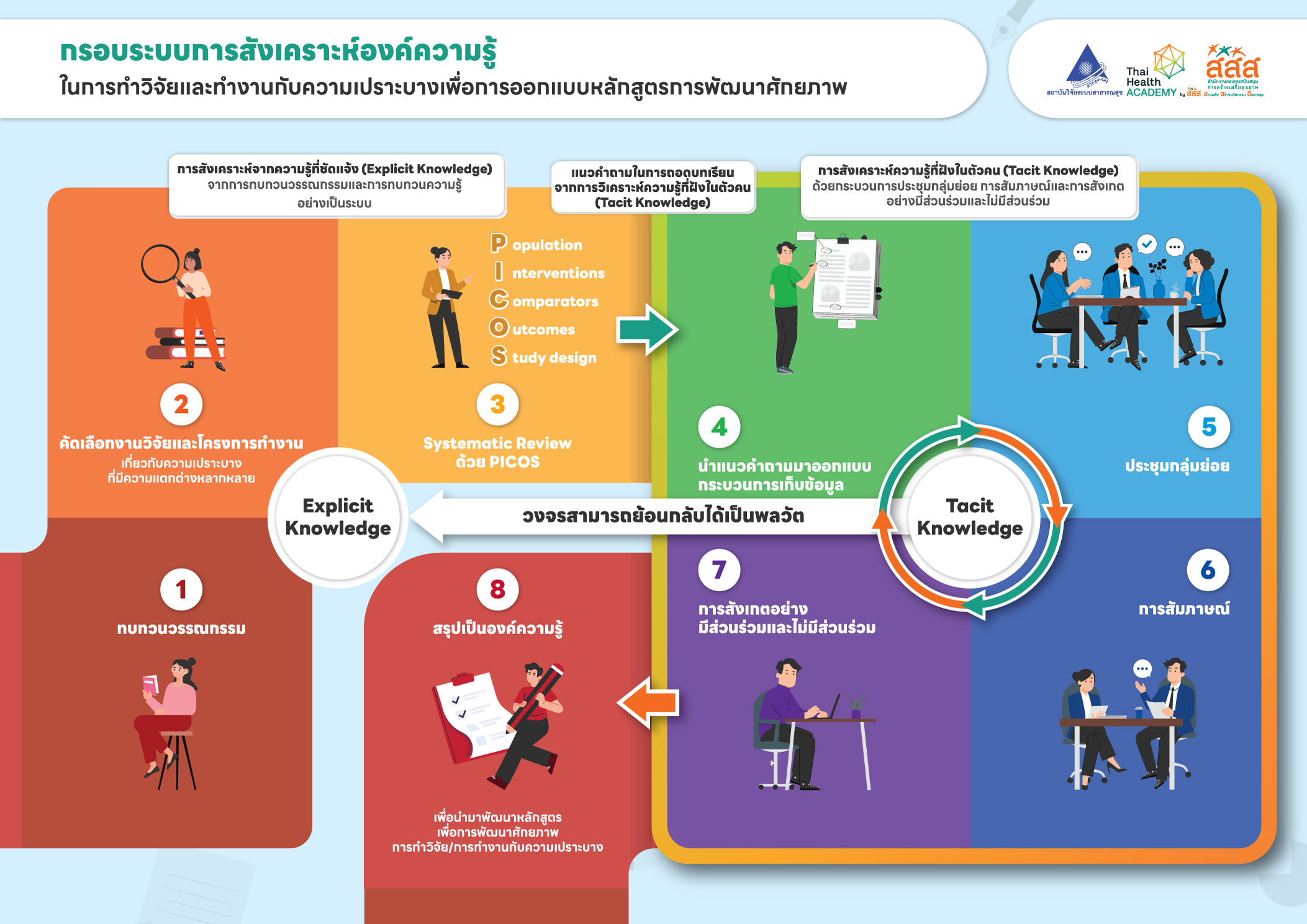
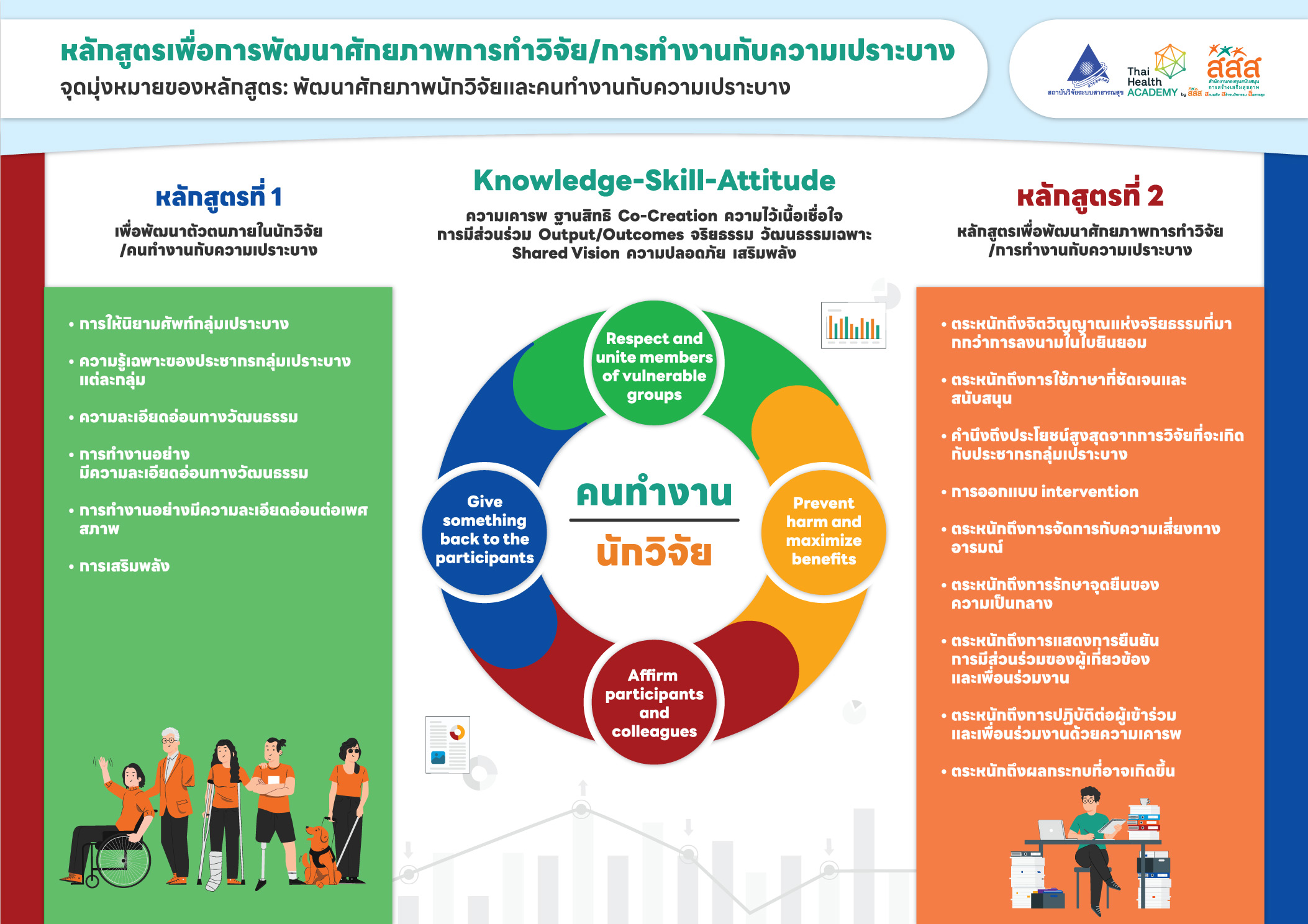
BEST
B: Build Capacity
Research project to develop knowledge construction system in vulnerable population research, for research capacity building and empowering research to improve the quality of life of vulnerable populations
E: Empowering Research
Research methodology that empowers vulnerability/vulnerable populations
S: Synthesis Tacit and Explicit Knowledge
The synthesis of explicit and tacit knowledge embedded within individuals
T: The Quality of Life of the Vulnerable Population
Vulnerability
A relative state where individuals cannot help themselves following crisis situations, due to insufficient risk management preparation or inability to adequately prepare for risk management due to various limitations.
Explicit Knowledge
The knowledge that is logical and rational, having undergone analysis and synthesis to become general principles that are not context-specific. It can be collected and transmitted in various forms such as books, manuals, documents, and reports, making it easily accessible to people.
Tacit Knowledge
Knowledge resides within each individual, whether in their heart (beliefs, values), brain (reasoning), hands, or other parts of the body (skills). It’s caused by learning experiences or natural talents and is specific to particular contexts. This type of knowledge is difficult to communicate or transfer in the form of numbers, formulas, or written text, but can be developed and shared. It is the knowledge that creates competitive advantage, and most organizational knowledge exists as tacit knowledge within individuals. |
Cultural Sensitivity
Cultural sensitivity refers to understanding cultural differences and learning to coexist with others in a society characterized by diversity. It encompasses comprehending cultural distinctions and acquiring the ability to live harmoniously with others in a heterogeneous society.
Social Support
Social support refers to the interactive process between individuals within social networks that leads to improved physical and mental health. Social support is an environmental factor comprising network structure and function within social networks. Social support, social reinforcement, or social nurturing enables individuals to receive love, care, recognition, and respect while fostering mutual bonds and a sense of belonging within the same society. It involves various forms of assistance and consists of four key components:
1) Emotional support
2) Instrumental support
3) Informational support
4) Appraisal support
Social Determinants of Health
Social Determinants of Health (SDH) refers to the environments in which people are born, grow, work, and live, and the systems that shape daily life conditions, such as economic policies and systems, development agendas, social norms, social policies, and political systems (World Health Organization). The concept of SDH reveals the complexity of health issues and introduces three key new paradigms in public health care, such as (1) Looking at disease and illness factors beyond individual-level factors, genetic or physiological factors, or behavioral factors, (2) Considering holistic factors that affect health throughout an individual’s entire lifespan, and (3) Increasing the role of disease prevention rather than medical treatment.
SDH significantly influences health equity issues, which are unfair and avoidable differences in health status both within and between countries, regardless of income level. People’s health and illness vary according to social hierarchy-the lower one’s socioeconomic status, the greater the tendency for poor health outcomes.
These factors extend beyond individual behaviors like eating, sleeping, and exercise, to include:
Income and financial security: Lower-income individuals often have less access to quality food, safe housing, and healthcare services
Education: Quality education provides people with the necessary skills and knowledge for making better health decisions
Housing and environment: Unsanitary, crowded, or dangerous environments negatively affect physical and mental health
Healthcare access: Poor or rural populations often face difficulties accessing healthcare services
Community safety: Communities with high violence levels impact both mental and physical health
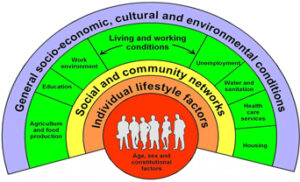
The Dahlgren-Whitehead Rainbow Model
The model was developed by Göran Dahlgren and Margaret Whitehead in 1991
Empowerment
Empowerment refers to promoting and developing individuals, organizations, and communities to enhance their capabilities, emphasizing public participation from problem identification through root cause analysis, leading to a sense of power and control over their living conditions or lives.
For the empowerment of research processes/work, especially research involving vulnerable populations, it is essential to focus on four fundamental principles including,
Respecting and uniting members of vulnerable groups includes: practicing culturally sensitive research, practicing gender-sensitive research, avoiding labeling and Blaming, using explicit, supportive language, using a continuum to measure variables, and developing policy applications
Prevent harmful and maximize benefits by focusing on preventing potential dangers and ensuring maximum benefits for vulnerable populations from the research
Affirm participants and colleagues
Give something back to the participants: The research empowerment must provide something in return to ensure that everyone involved in the research not only receives personal appreciation but also gains tangible benefits from their interactive experiences with researchers/workers, practitioners, and vulnerable population participants
Training curriculum for developing researcher/worker capacities in vulnerability/vulnerable groups working
Training curriculum 1: Core competencies for research/working with vulnerability
Curriculum description: This curriculum was developed through analysis and synthesis of research knowledge and work related to vulnerability, aimed at developing researcher/worker capabilities. This specialized type of research/work requires development across multiple dimensions, particularly in preparing researchers/workers with foundational thinking for working with vulnerability, respecting the humanity of all groups, and developing skills in designing respectful and participatory work processes. These are core competencies essential for any researcher or worker dealing with vulnerability.
Duration: 18 hours (3 days)
Learning Content:
Defining vulnerable groups
Specific knowledge about each vulnerable population group
Cultural sensitivity
Designing culturally sensitive work processes
Designing gender-sensitive work processes
Empowerment
Managing emotional risks Managing emotional risks
Learning outcomes:
Ability to independently define vulnerable groups in alignment with their specific work
Ability to design work processes that demonstrate cultural and gender sensitivity
Ability to build trust
Ability to design processes that promote empowerment and participation
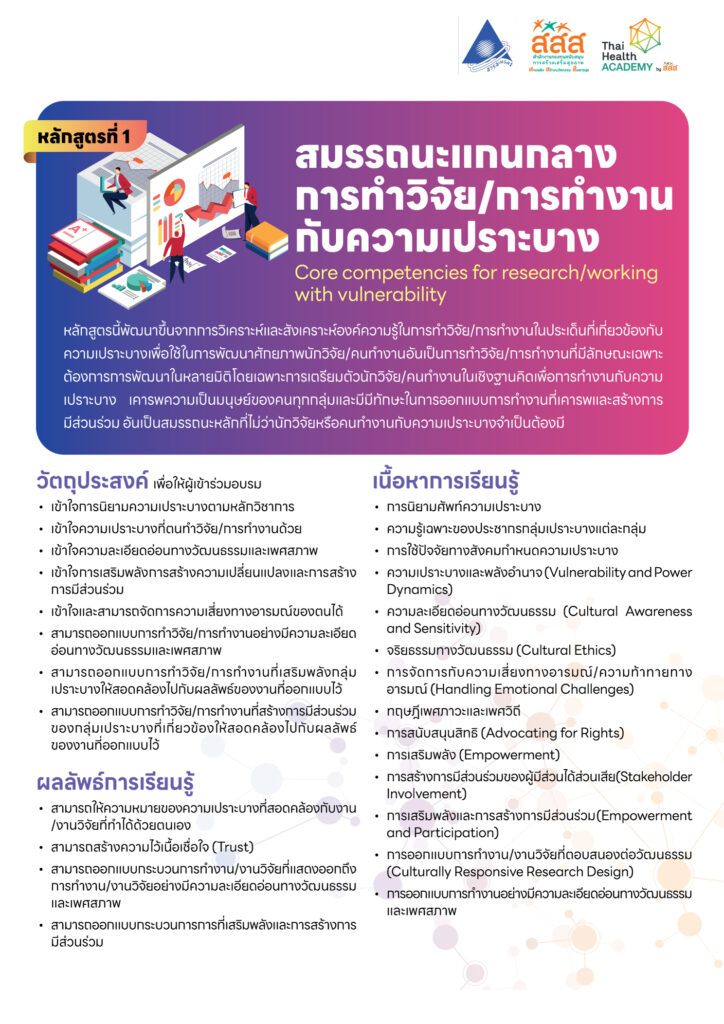
Training curriculum 2: Specific competencies for research with vulnerability
This curriculum is divided into 2 sub-curriculums including,
2.1 Specific competencies for research with vulnerability
Curriculum description: This curriculum was developed through analysis and synthesis of knowledge in conducting research with vulnerability, aimed at developing researcher capabilities in vulnerability-related issues. This specialized type of research requires development across multiple dimensions, particularly in developing specific competencies such as research ethics, language usage, and intervention design that researchers working with vulnerability must possess.
Duration: 12 hours (2 days)
Learning Content:
Ethics beyond consent form signatures
Using clear and supportive language in research
Maximizing benefits for vulnerable populations
Designing research interventions
Implementation science and outcome-oriented work design
Maintaining researcher neutrality
Confirming the participation of stakeholders and colleagues
Treating participants and colleagues with respect
Impact analysis in research
Learning outcomes:
Ability to protect vulnerable groups’ rights in all dimensions
Ability to design research processes related to vulnerability that respect and protect vulnerable groups’ rights
Ability to work as a team with all stakeholder groups
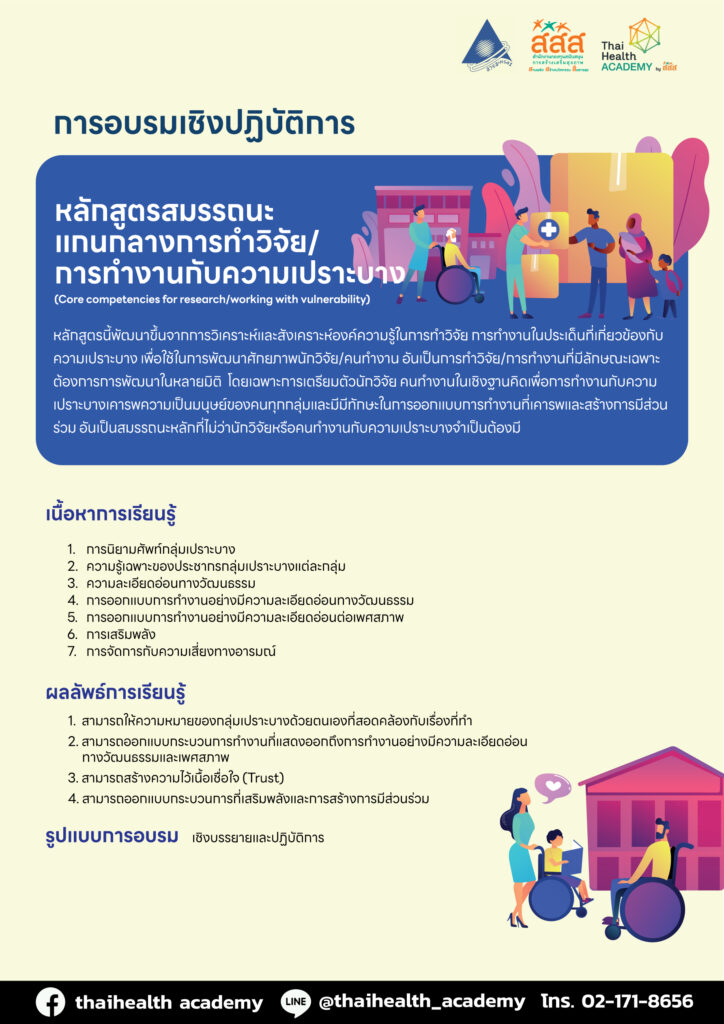
2.2 Specific competencies for working with vulnerability
Curriculum description: This curriculum was developed through analyzing and synthesizing knowledge about vulnerability research, aiming to enhance the capacity of professionals working on vulnerability-related issues. This work has specific characteristics that require development across multiple dimensions, particularly in specialized competencies such as work ethics, language usage, and the design of interventions that workers dealing with vulnerability must possess.
Duration: 12 hours (2 days)
Learning content:
Ethics that go beyond signing consent forms
Clear and supportive language usage
Maximizing benefits for vulnerable populations
Intervention design
Implementation science
Maintaining a stance of neutrality
Demonstrating confirmation of stakeholder and colleague participation
Treating participants and colleagues with respect by workers
Analysis of potential impacts by workers
Learning outcomes:
Able to protect the rights of vulnerable groups in all dimensions
Able to design research processes on vulnerability-related issues that respect and protect the rights of vulnerable groups
Able to work as a team with all stakeholder groups

Contact Us
© 2025 All Rights Reserved.